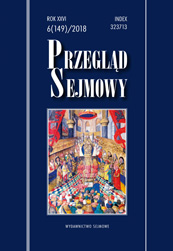Procedury ustawodawcze w pierwszym sejmie odrodzonej Rzeczypospolitej Polskiej (1919–1922). Regulacja prawna i praktyka parlamentarna
Legislative procedures in the first sejm of the renascent Republic of Poland (1919–1922). Legal regulations and parliamentary practice
Author(s): Piotr A. TusińskiSubject(s): History of Law, Political history
Published by: Kancelaria Sejmu
Keywords: reading of a bill; legislative initiative; Sejm committees; constituent assembly; small constitution of 1919; Marshal of the Sejm; general legislative procedure; Deputy-Rapporteur; parliamentary pract
Summary/Abstract: From its onset, the Legislative Sejm 1919–1922 took on all the fundamental functions of a parliament in a constitutional state, the most important of which was the legislative competence. The constituent assembly was forced to establish the legal rules of the functioning of the state as a whole, and to lay down the procedures of its own work. The legal-positive foundation of those procedures was rather modest. It comprised fragmentary regulations in the so-called small constitution of 20 February 1919, several ordinary statutes delegating competences to pass acts in the form of decrees and extraordinary legislation to the executive power, as well the most complex but incomplete norms included in the provisional regulations of the Legislative Sejm of 14 February 1919. The defi ciency of legal-positive regulation, apparent in numerous situations, had to be overcome by parliamentary practice referring to solutions applied in regulations and parliamentary customs of the Western states, particularly partitioning powers, in representations previously peopled by some Deputies of the constituent assembly, but also France and, incidentally, other countries. The chamber established its own solutions and customs relatively quickly and some of them lasted until the end of the interwar period. The legislative proceedings included numerous procedures: general, applied to pass ordinary statutes, and particular, i.e. legislative procedures to pass the constitution and the budget. The latter also included proceedings comprising elements of oversight and legislative procedure, such as the procedure of granting the consent to ratify international agreements and the procedure of approving the decree legislation passed by the executive. All procedures could be shortened (shortened proceedings) or accelerated (urgency clause), just as all comprised distinguished stages: the fi rst reading of a bill held at a plenary session (Deputies’ bills preferred); committee works on the bill; second reading before the whole chamber, beginning with a committee report, followed by a general, then a detailed debate, and partial, then general vote; third reading, sometimes preceded by an additional stage of committee works, and often automatically commenced immediately after the second reading; promulgation of an act by the Marshal of the Sejm and ordering its publication in the offi cial gazette.
Journal: Przegląd Sejmowy
- Issue Year: 2018
- Issue No: 6
- Page Range: 159-193
- Page Count: 35
- Language: Polish

